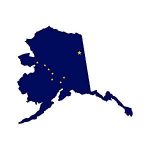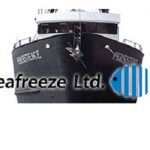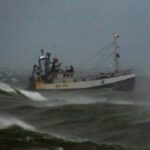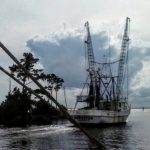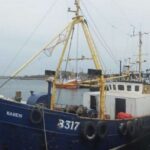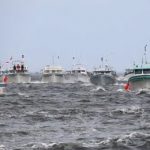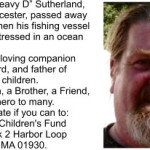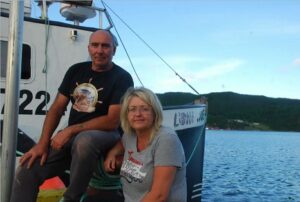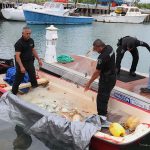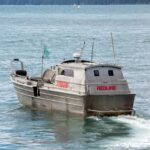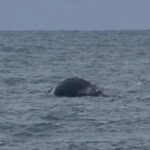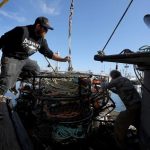Tag Archives: New England Aquarium
Right whale population grows 4%, but extinction remains a threat
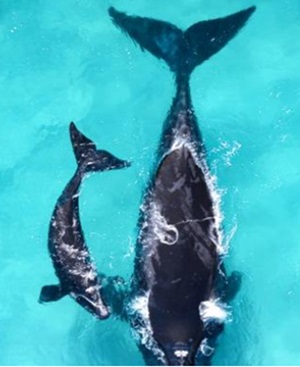 Conservationists are calling on the government, shipping and fishing industries to save the North Atlantic right whale from extinction despite an increase in its population. Researchers studying the whales said this week that the population increased to an estimated 372 in 2023. That’s an increase of about four percent from 2020, and “heartening news” after the whale’s population fell by about 25 percent from 2010 to 2020. The population of the right whale, which can weigh up to 150,000 pounds (68,039 kilograms) and lives off the East Coast, plummeted in the 2010s. Stressed by global warming and vulnerable to ship collisions and entanglement in fishing gear, their numbers fell to fewer than 360 by the early 2020s. more, >>CLICK TO READ<< 12:29
Conservationists are calling on the government, shipping and fishing industries to save the North Atlantic right whale from extinction despite an increase in its population. Researchers studying the whales said this week that the population increased to an estimated 372 in 2023. That’s an increase of about four percent from 2020, and “heartening news” after the whale’s population fell by about 25 percent from 2010 to 2020. The population of the right whale, which can weigh up to 150,000 pounds (68,039 kilograms) and lives off the East Coast, plummeted in the 2010s. Stressed by global warming and vulnerable to ship collisions and entanglement in fishing gear, their numbers fell to fewer than 360 by the early 2020s. more, >>CLICK TO READ<< 12:29
Whale not seen in 200 years spotted in New England waters, scientists say
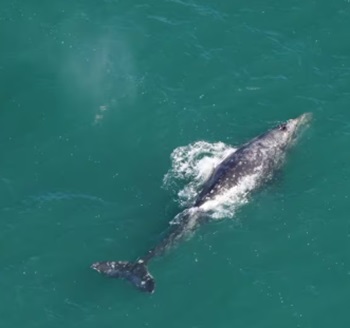 A gray whale that hasn’t been seen in 200 years has been spotted off the coast of Massachusetts, according to officials with the New England Aquarium. Aquarium scientists said the whale was seen on March 1 while they were flying over the ocean 30 miles south of Nantucket. Orla O’Brien is the associate research scientist in the Anderson Cabot Center for Ocean Life at the New England Aquarium. She said seeing the whale was completely unexpected. “I didn’t want to say out loud what it was, because it seemed crazy,” she said. more, >>click to read<< 13:10
A gray whale that hasn’t been seen in 200 years has been spotted off the coast of Massachusetts, according to officials with the New England Aquarium. Aquarium scientists said the whale was seen on March 1 while they were flying over the ocean 30 miles south of Nantucket. Orla O’Brien is the associate research scientist in the Anderson Cabot Center for Ocean Life at the New England Aquarium. She said seeing the whale was completely unexpected. “I didn’t want to say out loud what it was, because it seemed crazy,” she said. more, >>click to read<< 13:10
A treasured industry and an endangered species compete for survival
 On a cold morning in January, Chris Welch is already out preparing his boat. This time of year, his days begin before sunrise. It’s a ritual he’s grown accustomed to — at just 35 years old, he’s already spent decades working in the lobster business. “I started lobstering when I was six.” Welch said. Being a lobsterman in Maine is less of a job and more of a lifestyle. It’s a family business for many, including Welch, whose learned the ropes from his grandfather. But recently, the focus is less on what lobstermen’s ropes are pulling up and more on what may be running into them. Video, more, >>click to read<< 10:23
On a cold morning in January, Chris Welch is already out preparing his boat. This time of year, his days begin before sunrise. It’s a ritual he’s grown accustomed to — at just 35 years old, he’s already spent decades working in the lobster business. “I started lobstering when I was six.” Welch said. Being a lobsterman in Maine is less of a job and more of a lifestyle. It’s a family business for many, including Welch, whose learned the ropes from his grandfather. But recently, the focus is less on what lobstermen’s ropes are pulling up and more on what may be running into them. Video, more, >>click to read<< 10:23
Aquarium scientists ID dead whale found on Martha’s Vineyard
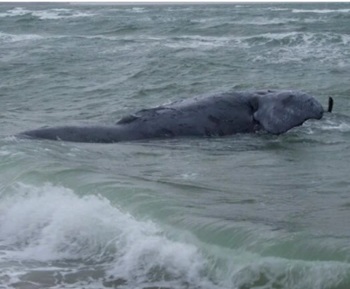 Scientists identified the dead North Atlantic right whale as a 3-year-old female known as #5120. NOAA Fisheries learned that the unnamed whale had washed ashore near Joseph Sylvia State Beach on Martha’s Vineyard on Jan. 28. The animal will undergo a necropsy this week to determine its exact cause of death. The Wampanoag Tribe of Gay Head (Aquinnah) and the International Fund for Animal Welfare secured the whale, according to the aquarium. State law enforcement officials also collected rope entangled around and embedded in the whale’s tail and turned it over to NOAA’s Office of Law Enforcement. In August 2022, researchers found the whale tangled up in fishing gear in the Gulf of St. Lawrence, Canada. Several attempts were made in January and February of 2023 to disentangle the whale after she was located off Cape Cod. more, >>click to read<< 13:01
Scientists identified the dead North Atlantic right whale as a 3-year-old female known as #5120. NOAA Fisheries learned that the unnamed whale had washed ashore near Joseph Sylvia State Beach on Martha’s Vineyard on Jan. 28. The animal will undergo a necropsy this week to determine its exact cause of death. The Wampanoag Tribe of Gay Head (Aquinnah) and the International Fund for Animal Welfare secured the whale, according to the aquarium. State law enforcement officials also collected rope entangled around and embedded in the whale’s tail and turned it over to NOAA’s Office of Law Enforcement. In August 2022, researchers found the whale tangled up in fishing gear in the Gulf of St. Lawrence, Canada. Several attempts were made in January and February of 2023 to disentangle the whale after she was located off Cape Cod. more, >>click to read<< 13:01
9 North Atlantic right whale calves born so far this breeding season
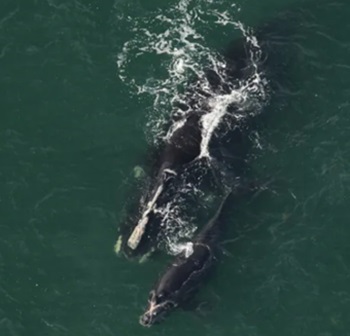 One month into the breeding season for North Atlantic right whales, nine calves have been born. Amy Warren, an assistant researcher at the New England Aquarium’s Anderson Cabot Center for Ocean Life, said she’s crossing her fingers for more births, but that the count at this stage is pretty much on par with previous seasons. “It’s been hard to judge because the trends have shifted a little bit earlier some years, a little bit later some years,” Warren said. “Last year at this time, I believe we had 10 calves. So we’re really not far off from that.” Photos, more, >>click to read<< 09:29
One month into the breeding season for North Atlantic right whales, nine calves have been born. Amy Warren, an assistant researcher at the New England Aquarium’s Anderson Cabot Center for Ocean Life, said she’s crossing her fingers for more births, but that the count at this stage is pretty much on par with previous seasons. “It’s been hard to judge because the trends have shifted a little bit earlier some years, a little bit later some years,” Warren said. “Last year at this time, I believe we had 10 calves. So we’re really not far off from that.” Photos, more, >>click to read<< 09:29
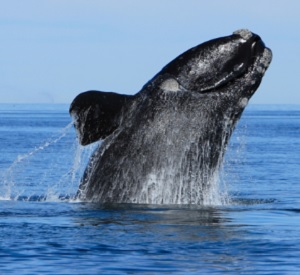
North Atlantic right whale population has steadied, scientists say
The population of critically endangered North Atlantic right whales appears to have levelled off after a decade of steep decline, according to updated data released this morning by Canadian and American scientists. Every fall, the North Atlantic Right Whale Consortium releases its best population estimate of the world’s most threatened large whale. Scientists in the consortium said Monday that the 2021 estimate of 340 North Atlantic right whales in existence has been recalculated to 365 primarily because of the number of calves born that year. The estimate for 2022 is 356. >>click to read<< 09:52

Scientist calls 6-year delay in Maine lobster rules ‘mind-boggling’
Scientists dedicated to saving North Atlantic right whales from extinction say they are optimistic they can work with the fishing industry to save the species. But they were blindsided last month when Maine’s congressional delegation put language in the federal budget to delay for six years regulations that are designed to protect the whales. Amy Knowlton, a senior scientist at the Boston-based New England Aquarium, said the impact of a six-year delay in regulations could be “dramatic.” “It’s mind-boggling that this would be allowed to happen,” she said. But the Maine lobster industry has fought hard against new regulations designed to protect the whales, saying lobstermen aren’t to blame for the whales’ continued decline. Backed by Gov. Janet Mills and the state’s congressional delegation, the industry won a major victory with the six-year delay. >click to read< 15:20
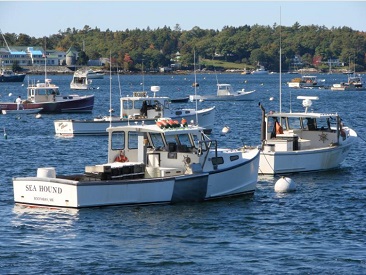
Maine lobstermen: The other endangered species?
When President Biden signs the $1.7 trillion omnibus bill into law, Maine’s lobster industry will take a six-year step back from the brink thanks to the efforts of Maine’s congressional delegation which secured a last-minute addition that put further restrictions to protect endangered right whales on hold. “The pause doesn’t mean this is over,” said Boothbay’s Troy Plummer, member of Maine Lobstermen’s Association (MLA) board of directors and lobster boat operator for nine years. “Everything is status quo until 2028, but we’ll have to do our homework,” said Boothbay Harbor’s Clive Farrin, lobsterman for more than 20 years and past president of Downeast Lobstermen’s Association. >click to read< 10:10

Maine political leaders push provision in federal spending bill decried by environmental groups as threat to right whales
Members of the delegation, including US Senator Susan Collins, said they plan to push a provision in the spending bill that would revive for 10 years federal fisheries rule that environmental groups successfully challenged in court earlier this year. Congressional leaders announced a framework for the spending legislation last Tuesday, and plan to use the days before Christmas to finalize details. In a letter Friday to Democratic congressional leaders, 15 environmental groups urged lawmakers to leave the language out of the spending bill. “This is a profound and disturbing end run around the legal system,” said Erica Fuller, senior attorney for the Conservation Law Foundation in Boston, on Saturday in a phone interview. >click to read< 07:44
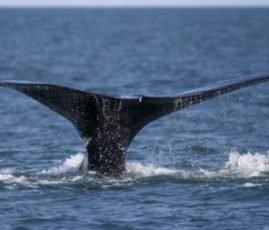
Planes can’t find entangled whale in search Wednesday
Planes and boats searched the Gulf of St. Lawrence on Wednesday, looking for a young North Atlantic right whale entangled in rope and other gear. An airplane saw the calf of a right whale known as 3720 last weekend, 48 nautical miles east of Shippagan, trailing fishing rope and buoys. The Department of Fisheries said at the time that it wasn’t known how long the yearling had been entangled. Whale expert Philip Hamilton of the New England Aquarium said lots of challenges come with finding a whale such as this one, which had previously last been spotted in March off Provincetown, Mass. (Where is the photo of the calf wrapped in fishing gear the plane didn’t take?!!) >click to read< 12:23
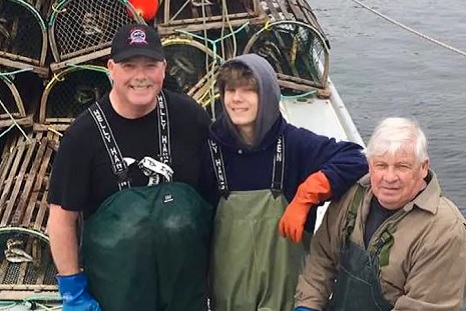
Regulations coming to Atlantic Canada could ensure safety of endangered right whales
Last month, Sierra Club Canada held a web discussion where it talked about the endangered North Atlantic right whale population in the Gulf of St. Lawrence and how new changes coming to the fishing industry could help protect them. DFO has been working to develop rope systems that are designed to release if too much force is applied suddenly. Currently, there are no regulations for fisherman to use low-bearing gear. Jenn Michael Lewis, who helps catch lobster in St. Peters Bay, said the response from fishermen in the community about the new rope regulations will likely be a negative one. “It has been a point of tension. There isn’t many right near St Peters Bay, many fishermen don’t see the point in switching,” Lewis said. >click to read< 08:10
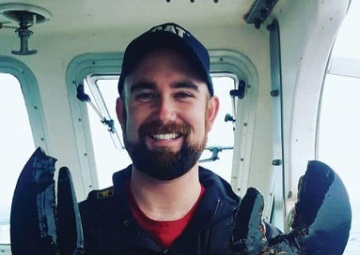
Lobster industry and lawmakers await court decision to determine legality of new restrictions
Maine and Massachusetts harvest more than 90% of the American lobsters sold in the U.S. and most lobstermen and New England lawmakers want to keep it that way. Over the past year, a dispute over new federal regulations on Maine’s lobster industry, intended to protect the endangered North Atlantic Right Whale,,, Mike Sargent became the captain of his own boat at 15. The 29-year-old is worried, however, that if regulations adopted by the National Oceanic and Atmospheric Administration in 2021 are ruled lawful by the U.S. District Court of the District of Columbia, that more expensive and stricter regulations could follow. “There’s talks of ropeless fishing and so on, and those are astronomically expensive and quite frankly could bankrupt this industry at the stroke of a pen,” Sargent said. Massachusetts lobsterman Dave Casoni said that it would cost lobstermen between $500,000-$600,000 to make the switch to ropeless traps, and if passed Casoni believes it could bankrupt the industry. Video, >click to read< 09:16

Right whale defenders question energy industry donations
A group opposing wind projects off the coast of Massachusetts released a report Tuesday that documents contributions from wind energy developers to environmental groups in the state, donations that the authors of the report say cast questions on the ability of groups to analyze the impacts that wind projects have on the endangered North Atlantic Right Whale. The report, released by the Save Right Whales Coalition, catalogs $4.2 million between wind developers like Vineyard Wind, Bay State Wind, and Orsted to environmental groups in Massachusetts such as the Environmental League of Massachusetts, New England Aquarium, and the Woods Hole Oceanographic Institute. >click to read< 09:35

Gulf of Maine: Lawsuits over North Atlantic right whale regulations coming to boil
Lobsterman Brian Cates lives so far at the edge of Maine he can look out the windows of his house and see Canadian boats out in Canadian waters. Cates and other New England lobstermen are worried about how the coming regulations issued by the National Marine Fisheries Service will affect their livelihoods. Cates fishes in disputed waters. There, around the mouth of the Bay of Fundy, there’s a strip of ocean claimed by both Canada and U.S. alike called the grey zone. Cates fishes up against Canadian lobstermen, their traps and lines often getting caught up on one another. And the rules coming down from the federal government are not helping, >click to read< 19:14

New England and Canada: Seafood watch list weighs ‘red-listing’ lobster. Lobstermen push back
An influential arbiter of the sustainability of seafood is considering whether to drop lobster caught off Maine and Canada from its roster of approved products. The Monterey Bay Aquarium’s Seafood Watch announced this week that it is reviewing whether to add eastern Atlantic lobster harvests and other trap-pot and gillnet fisheries to its Red List,” due to the risk they pose for the survival of the endangered North Atlantic right whale. Last year another seafood rating program, the Marine Stewardship Council, suspended and later reinstated its certification of part of Maine’s lobster fishery. Massachusetts lobstermen are pushing back on the description of their industry as unsustainable. >click to read< 10:39

ACK Residents Against Turbines not aligned with fossil fuel money
The Jan. 21 article by Doug Fraser, “Nuclear and Fossil Fuel Advocates, Wind Foes Among Backers of Right Whale Protection Suits,” misleads the public by attempting to draw a false link between ACK Residents Against Turbines, which opposes development of industrial-scale wind farms off the coast of New England, and other groups associated with the fossil fuel industry. Some groups oppose industrial offshore wind development because it will harm pristine ocean views enjoyed by all; others are opposed to the dramatic increase in electric rates experienced by countries that have adopted it or to the devastating impact it will have on commercial fishing. These are all valid concerns. ACK Residents Against Turbines is opposed to the industrialization of our ocean because the turbines, massive offshore substations, and vast undersea high voltage cable systems will damage the fragile marine ecosystem. >click to read< 15:12 By Vallorie Oliver President, Nantucket Residents Against Turbines
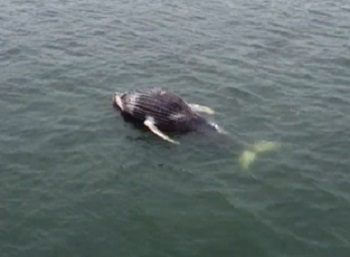
COVID-19 saves right whales by sinking cruise ships
Canada created the Shediac ship restricted zone in April 2020 just a couple weeks before Holland America’s Zaandam was scheduled to sail through that zone on a shipping lane used only seasonally by cruise ships as a shortcut to Quebec City. However, a COVID-19 no-sail order in March 2020 superseded that restriction. Consequently, there was not one Canadian ship right whale strike death in two years and only one Canadian crab entanglement death,,, Zero whales were killed by lobster gear. There has not been one death from lobster gear in the U.S. and only a couple in Canada in over 20 years but the Center for Biological Diversity, with no supporting data, claims the whales are going extinct based on lobster entanglements. >click to read< By Jim O’Connell 07:31

North Atlantic Right Whale: Extinction Is Looming. Everyone’s Fighting.
This May, new rules created for the lobster industry by the National Marine Fisheries Service will become official policy for boats operating in right whale territory. The agency estimates that lobster and Jonah crab traps are responsible for 95 percent of vertical end-line ropes in the areas where whale protections apply and therefore pose the most risk for entangling whales. The Fisheries Service says these changes will reduce the risk of death and serious injury by 69 percent. But in the months after the rules were finalized, the agency has seen pushback from conservation groups, who argue the new protections aren’t enough, and lobster fishing crews, who say the rules will harm their business. >click to read< 14:22
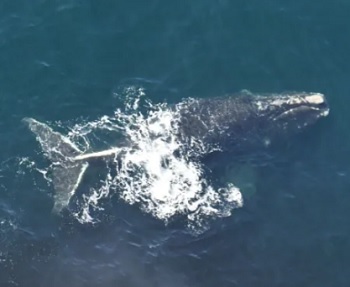
Research Team Supports Reinstatement of Maine Lobster Fishing Ban
The New England Aquarium’s Right Whale Research Team recently voiced their support of a recent ruling by a federal appeals court which reinstated protective measures for critically endangered North Atlantic Right Whales off the coast of Maine. Despite objections from the Maine Lobstering Union, the ban of lobster fishing in hundreds of miles of waters off the coast of Maine was upheld by the First U.S. Circuit Court of Appeals. In their statement, the Right Whale Research Team said,,, >click to read< 11:17
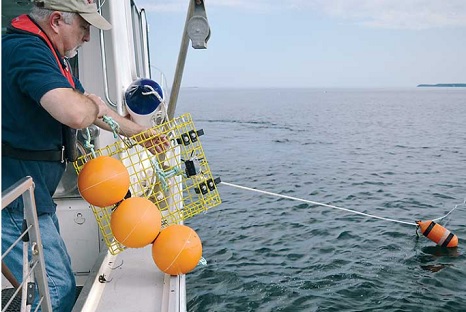
Crackpottery? A Ropeless Future for Lobster Fishing, they say!
The object thrown overboard was not in fact a trap but a ropeless fishing system deployed in a demonstration for passengers on the boat, including a film crew, a reporter and three people who study or advocate for right whales. Zack Klyver chartered the boat and arranged the demonstration. Through his consultancy, Blue Planet Strategy, he has been working as an intermediary between manufacturers, whale advocates and lobstermen, who find themselves on various sides of a regulatory survival equation as the federal government moves to protect endangered right whales. In ropeless fishing, Klyver sees a potential win for everyone involved, but getting there may take time and a fair amount of persuasion. Some funky photos, >click to read< 17:40
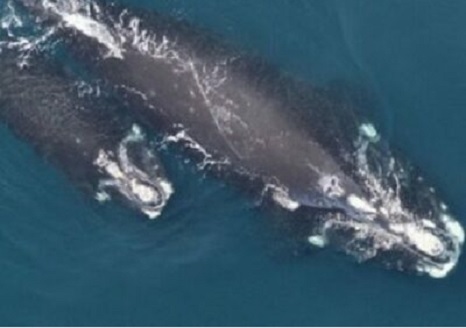
Whales Are Shrinking. Scientists Blame Commercial Fishing Gear
The findings, published today in the journal Current Biology, reveal that when fully grown, a North Atlantic right whale born today would be expected to be about one meter shorter than a whale born in 1980. The stunted growth of the whales coincides with an increasing rate of entanglements. A 2012 study from the New England Aquarium revealed,,, Researchers acknowledge that entanglements do not explain all of the reduced growth. Other factors might be climate change, collisions and noise from ships, and the shifting availability of tiny crustaceans called copepods, their primary food source. >click to read< 13:30
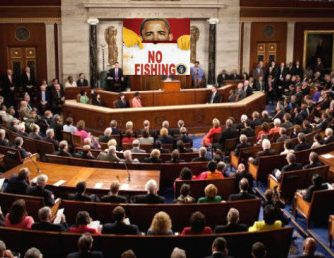
President Biden’s flurry of actions to protect the environment reignites a controversy about the Atlantic’s only marine monument
Last June, as part of a concerted campaign to dismantle the environmental policies of the Obama administration, Donald Trump met with fishermen in Maine and signed a proclamation that allowed commercial fishing in nearly 5,000 square miles of federally protected waters southeast of Cape Cod. In all, Biden ordered federal agencies to begin reviewing and restoring more than 100 environmental regulations that were dismantled or weakened by the Trump administration. While many of Biden’s orders could have a significant impact on New England, the review of the (Northeast Canyons and Seamounts) marine monument, a Connecticut-sized area that lies about 130 miles southeast of Provincetown, has stirred immediate controversy. >click to read< 11:44
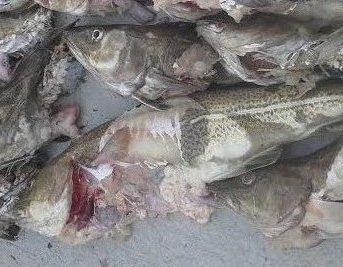
Maine’s booming seal population concerns local fishermen, biologists. Cod predation isn’t mentioned
Biologists say there are three points to consider: While the increase in harbor seals is creating a healthier ecosystem for the Gulf of Maine, it’s also creating problems for local lobstermen who say they’re a threat to their livelihoods, and it’s drawing new and potentially dangerous fish into our waters at a rate the state has never seen before. “I’ve had guys call me and say, ‘Are you having a problem with bait bags being ripped out because of the seals?’ and I say, ‘Yeah. I’ve had five or six.’ he says, ‘Rusty, I just had twenty traps in a row right, in a row. The seals went bang bang, bang, bang, bang right down through and ripped all the bags out,'” Court said. >click to read< Bait bags? What about cod fish bellies?!!

Judge James Boasberg’s court ruling puts future of Maine lobster industry at risk
United States District Judge James Boasberg’s order found that the National Marine and Fishery Services violated the Endangered Species Act by licensing the lobster fishery. In the second phase of the case, the judge will decide what action is necessary to rectify the situation. The Maine Lobstermen’s Association, an intervenor, and other industry stakeholders around the Gulf of Maine, will submit information for the judge to consider in his ruling.,, Activist Richard Strahan filed a motion in federal court in Bangor to stop fishing in Maine May 15, citing violations of the Endangered Species Act, Maine Public reported. The Maine Department of Marine Resources has no intention of curtailing lobster permits, said spokesperson Jeff Nichols. >click to read< 09:45
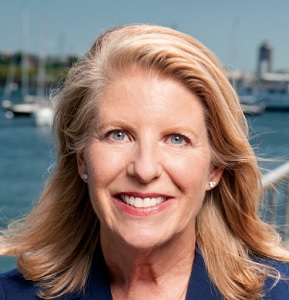
Why New England Aquarium is fighting back against the Trump administration
Decades of work at the New England Aquarium went into securing special protected status for an area of underwater canyons and mountains off Cape Cod.,, During a visit to Maine last Friday, President Donald Trump announced he was signing a proclamation to allow commercial fishing in the nearly 5,000-square-mile ecosystem, which was declared a national marine monument by former President Barack Obama in 2016.,, Vikki Spruill, the CEO and president of the New England Aquarium, called the Republican president’s proclamation“irresponsible and shortsighted.” “The Trump Administration has chosen a moment of national vulnerability to take aim at the environment,” Spruill said in a statement Monday, referring to the COVID-19 pandemic and the national protests against police brutality. >click to read< 13:00
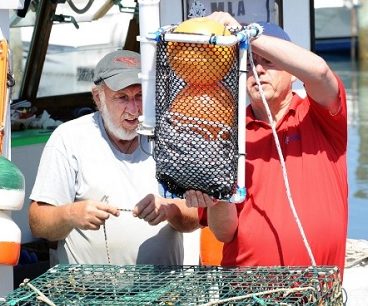
Maine Lobstermen Skeptical Of Proposal To Tie ‘Whale-Safe’ Seafood Label To Use Of New Fishing Gear. They should be.
A movement is emerging among conservation groups to create a “whale-safe” seal of approval for lobster caught with new types of gear designed to protect endangered North Atlantic right whales. But it could be a tough sell in Maine, where some say the iconic fishery is already sustainable.,, “That’s really important, that fishermen willing to test this gear, and certainly those fishermen fishing with ropeless gear should be rewarded,” says Erica Fuller, a lawyer at the Conservation Law Foundation, one of several organizations suing the federal government for stronger protections of the roughly 400 North Atlantic right whales remaining on the planet. >click to read< 10:36
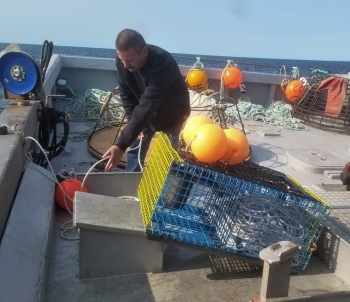
At the Ropeless Consortium’s second annual meeting
Scientists, fishermen and policy makers met on Wednesday in Maine to discuss this issue at the Ropeless Consortium’s second annual meeting. The North Atlantic Right Whale Consortium will continue the discussion of right whale conservation at their annual meeting Thursday and Friday.,,, “We here at the aquarium have been working hard on looking at reducing rope strengths and trying to get rope-less fishing as an option to reduce risk,” said Amy Knowlton, a Ropeless Consortium board member and senior scientist at the New England Aquarium. >click to read< 10:35
SeaWorld & Busch Gardens Conservation Fund Commits $900,000 to Protect Critically Endangered North Atlantic Right Whales – The announcement was made by Dr. Michael Moore of the Woods Hole Oceanographic Institution, during yesterday’s 2019 Ropeless Consortium meeting, >click to read<
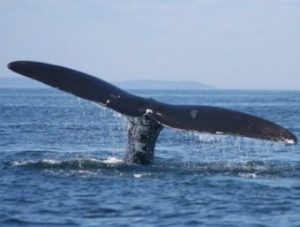
Eighteen scientists, environmentalist, blast Maine lobstermen’s stand on whale safety
“Reducing entanglement in East Coast waters of the United States is a critical part of a comprehensive strategy for right whale survival and recovery,” Scott Kraus, chief scientist for marine mammals at New England Aquarium’s Anderson Center for Ocean Life, and Mark Baumgartner, associate scientist at Woods Hole Oceanographic Institution and chairman of the North Atlantic Right Whale Consortium, said in a letter Tuesday to Sen. Susan Collins, R-Maine. >click to read< 19:44
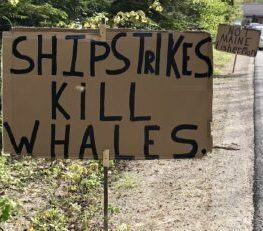
Lobstermen, environmentalists weigh in on right whale rules
Some of the largest and most powerful animal and environmental groups – including the Pew Charitable Trust, the U.S. Humane Society, the Conservation Law Foundation and Oceana – sent representatives to the hearing. They urged National Marine Fisheries Service to take immediate action to protect the whale, including proposals that even the team tasked by the fisheries service to come up with its whale protection plan had dismissed, such as offshore closures and ropeless lobster fishing. >click to read< 20:58

HR 1568: Rep. Fernandes and Colleagues Advocate for the Critically Endangered North Atlantic Right Whale
On Monday, State Representative Dylan Fernandes (D- Falmouth) and State Senator Cyr (D-Truro) hosted an event at the State House with the International Fund for Animal Welfare and the New England Aquarium, supporting North Atlantic right whale conservation efforts. The event included the presentation of a resolution, sponsored by Rep. Fernandes, that was passed through the House in support of the Federal SAVE Right Whales Act.,,, The event also included a special guest: Calvin, the New England Aquarium’s 42ft inflatable right whale. >click to read< 08:56 H.R.1568 text – >click to read<

































